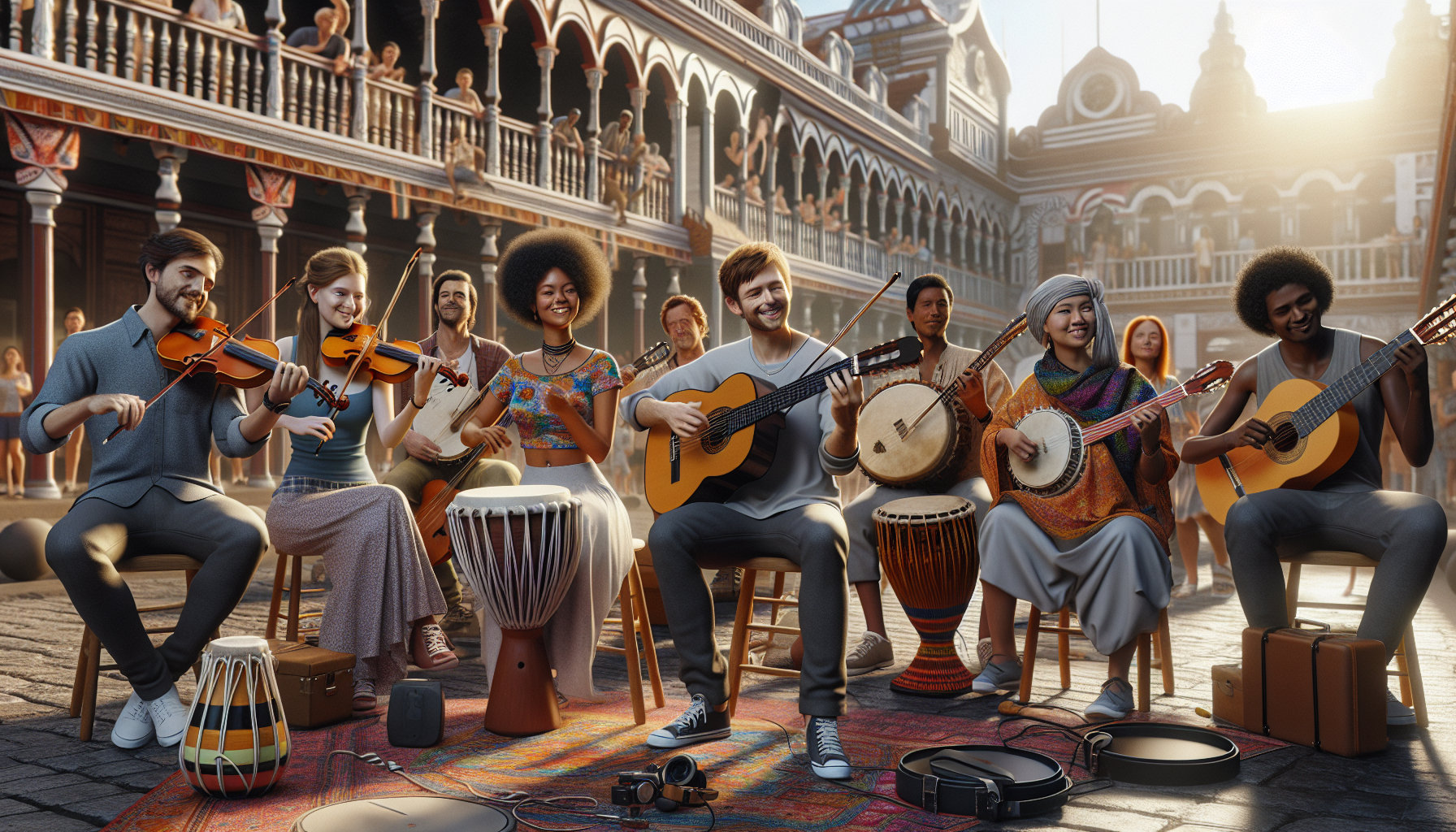In a world where boundaries are often defined by politics, geography, and language, there exists a universal medium capable of transcending these divides and uniting people from diverse backgrounds: music. 🎶 This article delves into the profound capacity of music to serve as a bridge between cultures, fostering understanding and appreciation across borders. From the rhythmic beats of African drums to the intricate melodies of Indian sitars, music speaks a language that everyone can understand, a language that touches the soul and stirs emotions, regardless of one’s origin. The exploration of this theme is not just an academic exercise but a celebration of humanity’s shared heritage and the power of artistic expression to create harmony in an often fragmented world.
As we embark on this journey, we will explore several fascinating dimensions of music’s role in cultural harmonization. The article will begin by examining historical instances where music has played a pivotal role in bridging cultural gaps, highlighting examples such as the jazz movement in the early 20th century, which brought together African and European musical traditions to create something uniquely American yet globally influential. We’ll also look at contemporary phenomena, such as the global spread of K-pop, which exemplifies how music can transcend cultural barriers, influencing and being influenced by a multitude of cultural contexts. By analyzing these instances, we will uncover the mechanisms through which music facilitates cultural exchange and mutual understanding.
Furthermore, the article will discuss the psychological and emotional aspects of music that make it such a powerful tool for cultural resonance. We will delve into how music evokes emotions, memories, and a sense of belonging, acting as a conduit for empathy and solidarity among people from different cultures. Additionally, we will explore the role of technology and globalization in amplifying music’s ability to bridge divides, considering how digital platforms have democratized music production and dissemination, allowing diverse voices to be heard worldwide. Join us as we celebrate the unifying power of music, a testament to human creativity and our innate desire for connection. 🌍🎵
The Universal Language of Music
Music, a universal language, transcends cultural, linguistic, and national barriers, forging connections between disparate groups. Its unique ability to communicate emotions and stories without words makes it an invaluable tool in bridging cultural divides. Throughout history, music has played a pivotal role in uniting people, offering a shared experience that fosters understanding and empathy. This universal nature of music is what allows it to resonate deeply with diverse audiences, creating a common ground where differences are celebrated and explored.
The process of creating and sharing music inherently involves a dialogue between cultures. As musicians borrow elements from different musical traditions, they create new forms that reflect a tapestry of cultural influences. This exchange not only enriches the music itself but also encourages listeners to appreciate and understand the cultural contexts from which these sounds emerge. As we navigate an increasingly globalized world, music offers a means to explore and embrace the richness of our diverse cultural heritage.
Technological advancements have further amplified music’s capacity to bridge divides. With platforms like Spotify, YouTube, and SoundCloud, artists from remote corners of the globe can share their music with a global audience. This accessibility allows for a greater exchange of cultural ideas and musical styles, fostering an environment where cross-cultural collaborations can flourish. Check out this insightful video on how technology is transforming the music industry: Technology’s Impact on Music by TechVision.
Music as a Tool for Cultural Exchange
Throughout history, music has been a vehicle for cultural exchange, enabling the sharing and merging of musical traditions. When cultures come into contact through trade, migration, or conquest, their musical practices often intermingle, leading to the birth of new genres and styles. This phenomenon can be observed in genres such as jazz, reggae, and hip-hop, which blend elements from various cultural backgrounds to create something unique and universally appealing.
For example, jazz emerged in the early 20th century in the United States, combining elements of African rhythms, European harmonies, and American blues. This genre quickly gained popularity worldwide, influencing musicians across continents and sparking new movements in places as diverse as Paris and Tokyo. Jazz’s ability to adapt and incorporate elements from different cultures has made it a symbol of musical innovation and cultural exchange.
Similarly, reggae music, which originated in Jamaica, has been embraced globally and has inspired countless artists from different cultural backgrounds. The genre’s themes of social justice and unity resonate with audiences worldwide, further cementing its status as a powerful tool for cultural connection. The table below highlights some key genres and their cultural influences:
| Genre | Primary Cultural Influences | Global Impact |
|---|---|---|
| Jazz | African, European, American | Global jazz festivals, cultural symbol of improvisation |
| Reggae | Jamaican, African | Influence on global music, themes of peace and unity |
| Hip-Hop | African American, Caribbean | Worldwide popularity, cultural movement |
How Music Fosters Understanding and Empathy
Music’s capacity to evoke emotions makes it a powerful medium for fostering empathy and understanding among different cultures. When we listen to music from another culture, we gain insights into the emotions and experiences that shape the lives of its people. This emotional connection can break down stereotypes and prejudices, encouraging us to view others with empathy and compassion.
Music festivals and cultural events serve as platforms for cultural exchange, bringing together artists and audiences from various backgrounds. These gatherings provide opportunities for people to experience and appreciate the music and culture of others firsthand. By participating in these events, individuals can broaden their cultural horizons and develop a deeper appreciation for the diversity of human expression.
Moreover, music education plays a critical role in promoting cultural understanding. When students are exposed to diverse musical traditions, they learn to appreciate the complexities and beauty of different cultures. This exposure not only enhances their musical skills but also fosters an open-minded and inclusive worldview. Encouraging children to engage with music from various cultures can lay the foundation for a more harmonious and empathetic global community.
The Role of Music in Social Movements
Music has long been a catalyst for social change, serving as a powerful tool for advocating justice and equality. Throughout history, musicians have used their art to raise awareness about social issues, inspire collective action, and give a voice to marginalized communities. Songs with powerful messages can unite people around a common cause, creating a sense of solidarity and purpose.
During the Civil Rights Movement in the United States, music played a crucial role in galvanizing support and inspiring activists. Songs like “We Shall Overcome” became anthems of the movement, providing hope and strength to those fighting for equality. Similarly, in South Africa, music was a vital part of the struggle against apartheid, with artists using their platforms to challenge oppressive systems and promote unity.
In recent years, music continues to be a driving force in social movements worldwide. From climate change protests to the fight for gender equality, musicians use their voices to amplify important messages and inspire change. The emotional power of music makes it an effective tool for mobilizing individuals and creating a sense of community among those striving for a better world. For a deeper understanding of music’s role in activism, watch this video: The Sound of Change: Music in Activism by Social Voices.
- Music as a medium of emotional expression transcends linguistic barriers.
- It provides a platform for cultural exchange and appreciation.
- Music has historically played a role in advocating for social change.
The Influence of Technology on Music and Culture
Technological advancements have profoundly impacted the way we create, share, and experience music. The rise of digital platforms has democratized the music industry, allowing artists from around the world to share their work with a global audience. This accessibility has led to an explosion of cross-cultural collaborations and the blending of musical styles, further enriching the global music landscape.
Streaming services like Spotify and Apple Music have made it easier than ever for listeners to discover music from different cultures. These platforms use algorithms to curate playlists and recommend artists, exposing users to a diverse array of sounds and genres. As a result, listeners can explore music from various parts of the world, gaining a deeper appreciation for cultural diversity.
Social media platforms have also played a crucial role in promoting cultural exchange through music. Artists can engage with their fans and share their creative process, providing a glimpse into their cultural influences and artistic journey. This interaction fosters a sense of connection and understanding between artists and audiences, bridging cultural divides through shared musical experiences.
Future Prospects: Music as a Cultural Bridge
As we look to the future, music’s role as a cultural bridge is likely to continue evolving. With the advent of virtual reality and immersive technologies, audiences will be able to experience music in entirely new ways, further blurring the lines between cultures. These technologies offer exciting possibilities for cross-cultural collaborations, enabling artists to create immersive experiences that celebrate the diversity of human expression.
Furthermore, as the world becomes increasingly interconnected, the demand for cross-cultural understanding and collaboration will grow. Music, with its ability to convey emotions and stories across linguistic and cultural barriers, will remain a vital tool in fostering this understanding. By embracing and celebrating the rich tapestry of global musical traditions, we can build a more inclusive and harmonious world.
To explore the future of music and cultural exchange, watch this thought-provoking video: The Future of Music and Culture by Future Sounds.

Conclusion
In conclusion, the profound influence of music as a universal language cannot be overstated. Throughout this article, we have explored how music serves as a powerful tool for bridging cultural divides and fostering mutual understanding among diverse communities across the globe. From historical examples to contemporary phenomena, music has consistently played a pivotal role in creating a shared space where differences are celebrated and commonalities are amplified.
Firstly, we delved into the historical context, highlighting how music has always been intertwined with cultural exchange. From the Silk Road’s vibrant amalgamation of Eastern and Western influences to the spread of African rhythms across the Americas, we see that music has been instrumental in shaping civilizations and fostering cultural fusion. These historical precedents set the stage for understanding the intrinsic power of music in bridging divides.
Secondly, we examined the role of music in today’s interconnected world. In an era marked by globalization and digital connectivity, music transcends geographical boundaries more effortlessly than ever. Platforms like Spotify and YouTube have democratized music access, allowing listeners to explore sounds from every corner of the earth. This global exchange of musical traditions not only enriches our listening experience but also cultivates empathy and appreciation for different cultures. The rise of global music festivals and collaborations between artists from various backgrounds further exemplifies how music continues to unite us in our diversity.
Additionally, we explored the psychological and emotional impact of music, emphasizing how it can evoke empathy and understanding. Music has the unique ability to convey emotions that are often difficult to articulate, enabling listeners to connect on a deeper level. This emotional resonance is crucial in breaking down stereotypes and fostering a more inclusive world. Through initiatives like Playing For Change, where musicians from around the world collaborate on songs promoting peace and unity, we witness music’s potential to inspire collective action towards a more harmonious society.
Moreover, we discussed the socio-political implications of music as a catalyst for change. Music has been at the forefront of many social movements, giving voice to the marginalized and challenging oppressive systems. From the civil rights anthems of the 1960s to contemporary protest songs, music has always been a powerful medium for advocating justice and equality. It empowers individuals to raise their voices and inspires communities to mobilize for positive change.
The importance of music in education and its role in fostering cultural awareness was also addressed. Integrating music education into curricula can enhance students’ understanding of different cultures and promote cross-cultural dialogue. By learning about the origins and significance of various musical traditions, students gain a broader perspective of the world, preparing them to become global citizens in an increasingly interconnected society.
In light of these insights, it is imperative to recognize and support the role of music in promoting cultural harmony. Governments, educators, and individuals alike must champion initiatives that leverage music as a tool for cultural exchange and mutual understanding. Whether through policy-making, educational programs, or personal exploration, we all have a part to play in nurturing the power of music to bring people together.
As we continue to navigate the complexities of a globalized world, let us remain mindful of the unique ability of music to bridge divides and celebrate diversity. By embracing music’s universal language, we can build a more empathetic and connected global community. 🎶
We invite you, dear readers, to reflect on the role of music in your own lives and communities. How has music influenced your understanding of different cultures? In what ways can you use music to promote unity and understanding in your own circles? We encourage you to share your thoughts and experiences in the comments section below. Let’s keep this conversation alive and continue to explore the endless possibilities that music offers in creating a more harmonious world.
For further exploration of this topic, consider visiting the following resources:
– Spotify’s Global Music Charts
Thank you for joining us on this journey through the transformative power of music. May we continue to harmonize cultures and create lasting resonance across borders. 🌍🎵
Toni Santos is a sensory storyteller and soundscape artisan whose work explores the forgotten language of the Earth through acoustic ecology storytelling. With a deep reverence for the natural world’s sonic textures, Toni crafts narratives that awaken our ears to the subtle music of forests, winds, waters, and wild silence.
His creative journey is rooted in a desire to preserve and interpret the acoustic heritage of environments, both ancient and fragile. From the echo of birdsong in a disappearing jungle to the resonance of stones in sacred landscapes, Toni’s stories reflect the memory held in sound—often overlooked, yet deeply felt.
With a background in environmental aesthetics and sonic design, Toni blends field recordings, visual symbolism, and poetic insight to create immersive experiences that honor the sonic soul of nature. His work does more than document; it invites listeners to re-tune themselves to the rhythms of life that still pulse beneath modern noise.
As the voice behind Vizovex, Toni shares sound-based studies, ambient narratives, and reflective content that help others reconnect with how sound shapes memory, meaning, and place.
His work is a tribute to:
The lost soundscapes of vanishing ecosystems
The role of natural acoustics in cultural and emotional memory
The healing potential of listening deeply to the world
Whether you’re an artist, an ecologist, or someone drawn to the quiet power of listening, Toni invites you into a space where every rustle, ripple, and resonance becomes a story—one note, one place, one heartbeat at a time.




